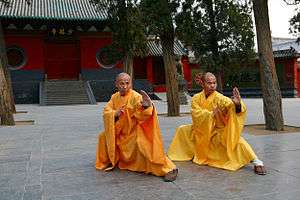Cao Jiwu
| Part of a series on |
| Chinese martial arts (Wushu) |
|---|
 |
|
Styles of Chinese martial arts
|
| Wushu in the world |
|
Historical locations Chen Village (陳家溝) |
| Wushu athletes/practitioners |
|
Legendary figures Bodhidharma (菩提達摩) |
|
Historical individuals Yue Fei (岳飛; 1103—1142) |
|
Modern celebrities Bruce Lee (李小龍 1940—1973) |
| Wushu influence |
|
Related |
Cao Ji Wu (Chinese: 曹繼武), (1662-1722), was a Chinese master of the internal martial art of Xinyi (Heart and Intention Boxing), precursor of Xingyi (Form and Intention Boxing). According to accepted theory, he is probably the second lineage holder of the art. Other, less credible, theories consider Bodhidharma or Yue Fei as the originators of the style.[1]
Cao Ji Wu is said to have studied with Ji Jike for twelve years, gaining great martial prowess. In 1693, during the reign of the Kangxi Emperor, of the Manchu-led Qing Dynasty, Cao Ji Wu passed the highest level military examinations, gaining the highest score of all the candidates, and was personally appointed by the emperor as head superintendent of one of the counties in Shaanxi Province. He is said to have died of hypothermia at the age of 36, while directing troops in the relief effort after the flooding of the Han River in Shaanxi.
His student Dai Long Bang became the first generation of the Shanxi branch of Xingyi practitioners. He had another outstanding disciple called Ma Xueli. In 1750, Dai Long Bang, in “The Six Harmonies Fists” stated that “Ji Jike, also known as Ji Long Feng, born at the end of the Ming Dynasty, discovered the text of Yue Fei, and taught Cao Ji Wu in Qiu Pu”. From this text we have confirmation that Cao Ji Wu was the first student of Ji Jike.
References
- ↑ "Historical Origins of Xingyi Quan". Retrieved March 22, 2016.